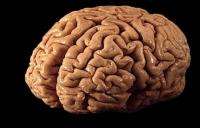Researchers gain new insight into prefrontal cortex activity

The brain has a remarkable ability to learn new cognitive tasks while maintaining previously acquired knowledge about various functions necessary for everyday life. But exactly how new information is incorporated into brain systems that control cognitive functions has remained a mystery.
A study by researchers at Wake Forest Baptist Medical Center and the McGovern Institute of the Massachusetts Institute of Technology shows how new information is encoded in neurons of the prefrontal cortex, the area of the brain involved in planning, decision making, working memory and learning.
"In this study we were able to isolate activity directly from the brain, allowing us to 'see' what was happening in the prefrontal cortex before and after a new task was learned," said Christos Constantinidis, Ph.D., associate professor of neurobiology and anatomy at Wake Forest Baptist and senior author of the study, published in the March 5 online edition of Proceedings of the National Academy of Sciences.
To gain insight into how learning a new task affects the prefrontal cortex, the researchers analyzed the electrical activity of neurons before and after training for the performance in two short-term memory tests. Two monkeys initially looked at a computer screen while various shapes, such as squares and circles, were displayed, and researchers recorded the electrical activity occurring in the brain. The same animals were then trained to recognize the various shapes, and to remember whether two symbols matched each other.
Using computational analysis of the neuronal recordings, the researchers compared data to assess what information was present before training and what new information arose while learning a new task. They found that learning was associated with activation of a small number of neurons that were highly specialized for the new task, while the same neurons maintained the existing information that was present before training.
"In essence, this select group of neurons was able to multitask by learning new information while retaining information they were already specialized for," Constantinidis said. "Our results show that although there was little change in the amount of basic stimulus information that neurons encoded before training, more complex information about whether the symbols matched became incorporated throughout the prefrontal cortex after training."
Overall these findings shed light on how new information is incorporated into the prefrontal cortex activity and how neural activity codes information, which should lead to richer theories of how the prefrontal cortex controls behavior and how information is encoded in neural activity more generally.
"We hope that our findings will help others who work with patients who have short-term memory problems resulting from strokes or traumatic brain injuries," Constantinidis said. "Computerized training to perform cognitive tasks, like those used in our study, has shown promise in cognitive rehabilitation, and for treatment of mental illnesses and conditions, such as schizophrenia and ADHD."

















